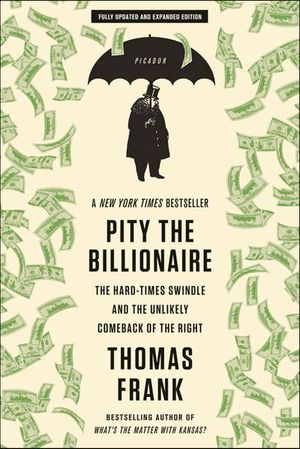Pity the Billionaire
Published by Henry Holt and Co.
New York Times Bestseller: A “witty and highly readable” account of the wildly unexpected cultural and political reactions to the Great Recession (Financial Times).
From the author of What’s the Matter with Kansas?, this is an updated and expanded edition of “a brilliant expose of the most breathtaking ruse in American political history: how the Right turned the biggest capitalist breakdown since 1929 into an opportunity for themselves” (Barbara Ehrenreich, author of Nickel and Dimed).
Economic catastrophe usually brings social protest and demands for change—or at least it’s supposed to. But when Thomas Frank set out in 2009 to look for expressions of American discontent, all he could find were loud demands that the economic system be made even harsher on the recession’s victims and that society’s traditional winners receive even grander prizes.
The American Right, which had seemed moribund after the 2008 election, was strangely reinvigorated by the arrival of hard times. The Tea Party movement insisted not that we question the failed system but that we reaffirm our commitment to it. Republicans in Congress embarked on a bold strategy of total opposition to the liberal state. And TV phenom Glenn Beck demonstrated the commercial potential of heroic paranoia and the purest libertarian economics.
In Pity the Billionaire, Frank examines the peculiar mechanism by which dire economic circumstances delivered unexpected political results. Using firsthand reporting, he gives us the first full diagnosis of the cultural malady that has transformed collapse into profit, reconceived the Founding Fathers as heroes from an Ayn Rand novel, and enlisted the powerless in a fan club for the prosperous.
“Tom Frank, as ever, makes some wickedly clever observations and produces some surprising answers.” —Vanity Fair
“This is the kind of analysis—historically astute, irreverent and droll—that makes Frank such an invaluable voice.” —San Francisco Chronicle
“His eye for detail and his ability to capture a scene reminded me of reading zoologist Dian Fossey on a group of strange political primates.” —The Washington Post
From the author of What’s the Matter with Kansas?, this is an updated and expanded edition of “a brilliant expose of the most breathtaking ruse in American political history: how the Right turned the biggest capitalist breakdown since 1929 into an opportunity for themselves” (Barbara Ehrenreich, author of Nickel and Dimed).
Economic catastrophe usually brings social protest and demands for change—or at least it’s supposed to. But when Thomas Frank set out in 2009 to look for expressions of American discontent, all he could find were loud demands that the economic system be made even harsher on the recession’s victims and that society’s traditional winners receive even grander prizes.
The American Right, which had seemed moribund after the 2008 election, was strangely reinvigorated by the arrival of hard times. The Tea Party movement insisted not that we question the failed system but that we reaffirm our commitment to it. Republicans in Congress embarked on a bold strategy of total opposition to the liberal state. And TV phenom Glenn Beck demonstrated the commercial potential of heroic paranoia and the purest libertarian economics.
In Pity the Billionaire, Frank examines the peculiar mechanism by which dire economic circumstances delivered unexpected political results. Using firsthand reporting, he gives us the first full diagnosis of the cultural malady that has transformed collapse into profit, reconceived the Founding Fathers as heroes from an Ayn Rand novel, and enlisted the powerless in a fan club for the prosperous.
“Tom Frank, as ever, makes some wickedly clever observations and produces some surprising answers.” —Vanity Fair
“This is the kind of analysis—historically astute, irreverent and droll—that makes Frank such an invaluable voice.” —San Francisco Chronicle
“His eye for detail and his ability to capture a scene reminded me of reading zoologist Dian Fossey on a group of strange political primates.” —The Washington Post
BUY NOW FROM
COMMUNITY REVIEWS

